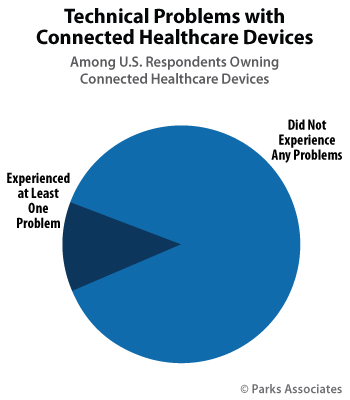Customer Support Needs in Connected Healthcare
 CONNECTIONS™: The Premier Connected Home Conference, which was recently held in San Francisco, featured a very vibrant discussion where panelists and audience members attempted to determine if there was a significant market opportunity for the support of connected healthcare and fitness devices.
CONNECTIONS™: The Premier Connected Home Conference, which was recently held in San Francisco, featured a very vibrant discussion where panelists and audience members attempted to determine if there was a significant market opportunity for the support of connected healthcare and fitness devices.
Parks Associates presented research which highlighted the fact that the majority of connected health and fitness device owners (more than 90%) set up their devices on their own or with the help of friends and family. Most consumers do not rely on professionals to set up their connected health devices. Since many of these devices are new to market, one would think that consumers would encounter a number challenges when setting them up. It turns out only 4% of these consumers report experiencing problems when setting up their devices. When it comes to initial device setup, connected healthcare devices have dramatically outperformed smart home devices, where one-half of consumers report experiencing problems when setting up their devices.
Even outside of the setup process, very few consumers report problems of any kind, with only 12% of consumers reporting problems while using their connected healthcare devices. The primary issues reported by connected healthcare device owners are similar to those reported by smart home device owners. These include connectivity issues and short battery life. However, connected health device owners also have concerns with perceived data inaccuracies and synching problems from device to app. Compared to other connected device categories including computing, entertainment, and smart home devices, consumers of healthcare devices have fared well. Their primary challenge emerges when they do encounter problems and need help to resolve them. Parks Associates research in Support for IoT and Emerging Technologies shows that while one-half of connected healthcare device owners who experienced problems with their devices received professional help, 21% of problems with these devices went unresolved.
On the surface, this indicates a huge support opportunity. However, industry experts posit that the majority of problems consumers encounter are due to the misuse of these devices. And, the perceived data inaccuracies are usually the result of not getting the data consumers want to see—for instance, if a digital weightsacle reading or a blood pressure cuff reading is higher than the consumer anticipated. If this is the case, and connected healthcare devices are in fact reliable, then the primary opportunity in the space is enablement support. However, enablement support is notoriously difficult to monetize and diminishes the opportunity for premium technical support services in this market. To achieve success in this market, premium technical support service offers must create additional value by including other services on top of traditional “how to” and break/fix support.
Parks Associates will host its annual Connected Health Summit in San Diego next month, where keynotes from Aetna, UnitedHealthcare, Humana, and Omron will discuss how to engage consumers with connected healthcare solutions and successful approaches for the deployment of connected healthcare products and services.
Further Reading:
- On-Demand Care: The Patient Wants to See You Now
- 60% of U.S. smart watch owners use their watch to count steps
- Support Strategies for an IoT World
Next: New Whitepaper Addresses Privacy and Security Concerns for Connected Devices
Previous: 3 Technologies for Technical Support in 2017
Comments
-
Be the first to leave a comment.
Post a Comment
Have a comment? Login or create an account to start a discussion.


